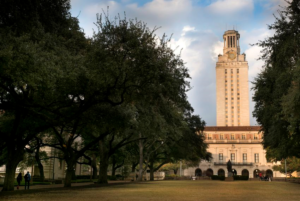Blogger’s Note: This post appeared originally on KETR-FM’s website. I am reposting on High Plains Blogger because I want readers of this blog to see it, too.
The media and the University of Texas-Austin might have gotten a bit ahead of themselves in praising the flagship UT System campus officials’ decision to waive college tuition for students who come from families that fall under a certain income level.
That’s the word, at least from Texas A&M University System Chancellor John Sharp.
Hmm. Is he right?
Sharp has penned a letter to the editor that I presume ran in several newspapers around the state to declare that the A&M System has been offering free college tuition for years. So, the UT-Austin initiative isn’t new, says Sharp.
Sharp noted in his letter that “Several of you have asked if Texas A&M University has plans for a tuition-free program for students from low-income families similar to what the University of Texas recently announced. In fact, Texas A&M University implemented virtually the … same program 10 years ago. The Texas A&M program is called Aggie Assurance. And since 2008, the program has allowed 33,447 undergraduate students from families earning less than $60,000 a year to attend college tuition free.”
The UT System recently announced plans to waive tuition for students whose families earn less than $65,000 annually. It drew high praise around the state. I used my own blog, High Plains Blogger, to speak well of the UT System’s efforts to make college more affordable. To be honest, I was unaware of the Aggie Assurance program to which Sharp has alluded in his letter.
Sharp added, “In addition, Texas A&M University System regents set aside $30 million additional dollars in 2018 to provide help for students of families who earn $100,000 or less or who are stricken with financial hardships such as losses during natural disasters, death of a breadwinner or some other calamity.
“This program, dubbed Regents’ Grants, was created after Hurricane Harvey and has helped hundreds of students who lost books, clothes and transportation, among other things.”
The program is available not just to Texas A&M flagship-campus students, but to all students within the A&M System, according to Sharp.
Are you paying attention, Texas A&M-Commerce students?
These programs are worth mentioning in the context of the 2020 presidential campaign that is becoming to obtain momentum. Several of the horde of Democrats running for their party’s presidential nomination have talked openly about offering free college tuition for all public university students. The UT System as well as the A&M System are dipping into their substantial endowments to fund the assistance programs they are offering their students.
So, I suppose you could suggest that two of Texas’s major public university systems are ahead of the proverbial curve on that one.
I know what many critics have said about Texas’s commitment to public education, that it isn’t nearly as robust, progressive and proactive as it should be. I won’t debate all of that here.
However, I do want to commend the Texas A&M and the University of Texas systems for their efforts to provide quality public university education opportunities for students and their families who otherwise might be unable to shoulder the financial burden that such an education often brings with it.


